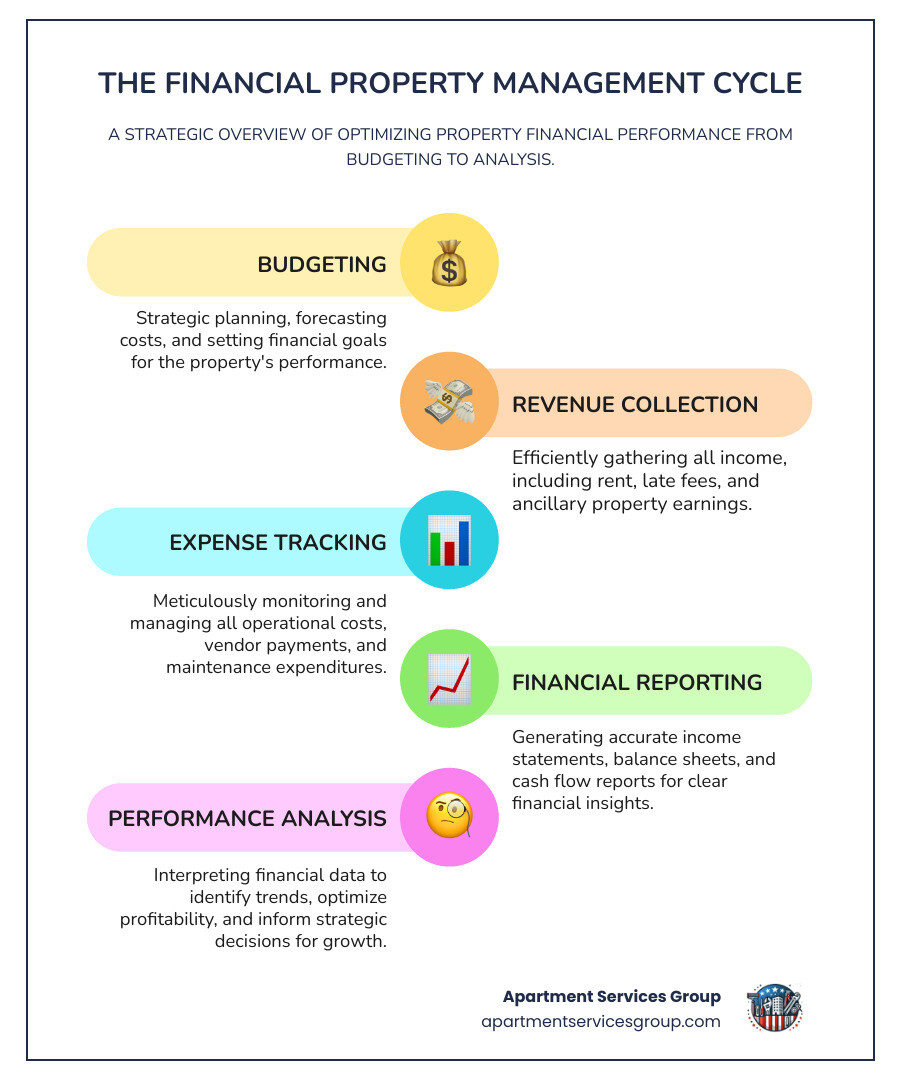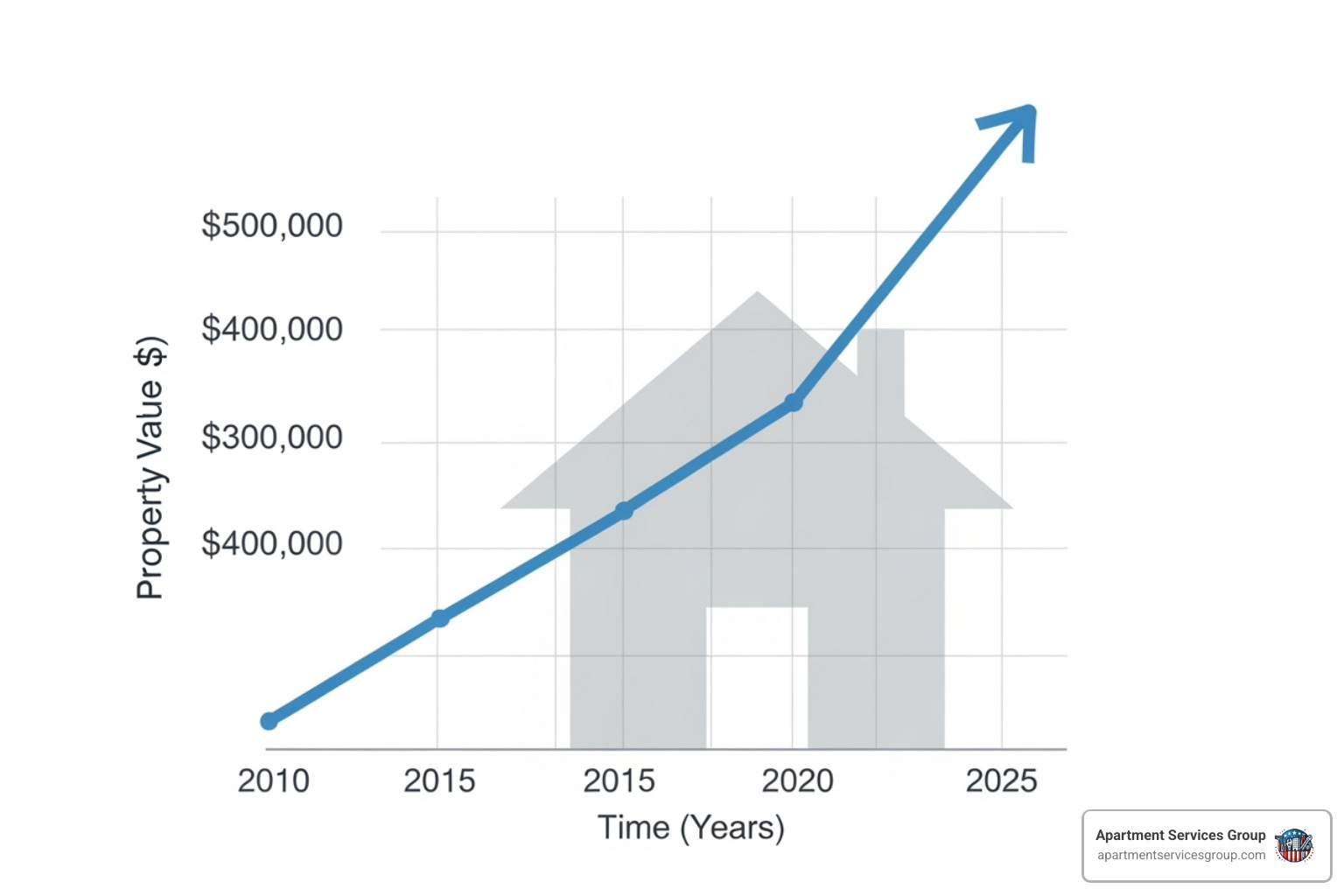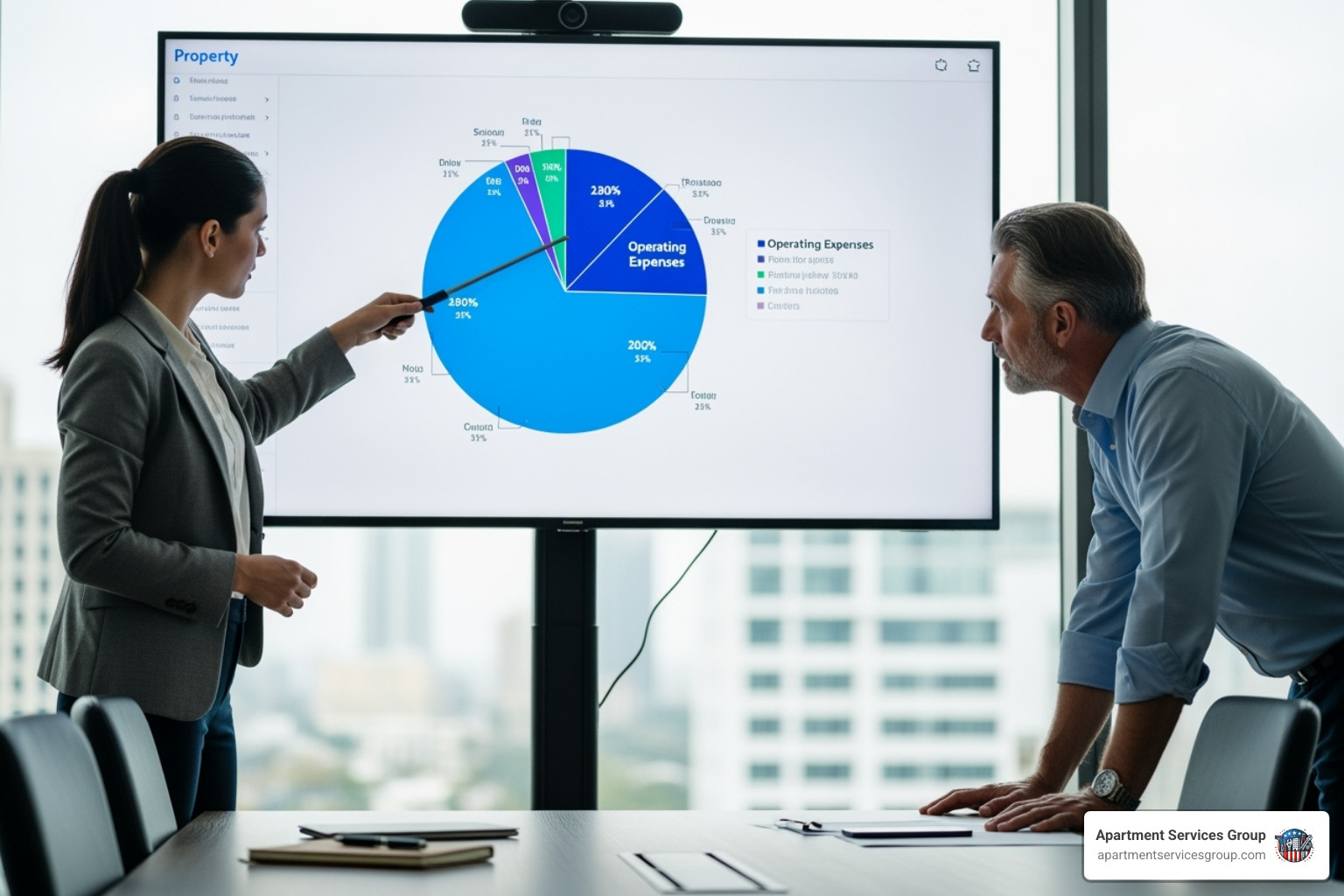Financial property management: Top 3 Flawless Tips
Why Financial Property Management is the Backbone of Real Estate Success
Financial property management is the strategic oversight of costs and revenues to optimize a property’s financial performance and increase its long-term value. It covers everything from rent collection and expense tracking to financial reporting and tax compliance.
Key components include:
- Revenue and expense tracking
- Financial reporting and analysis
- Tax compliance and record-keeping
- Budget planning and forecasting
- Risk management and insurance coverage
Poor financial management can lead to cash flow problems and declining property values. In contrast, effective financial oversight reduces risk, supports long-term planning, and builds trust with owners and stakeholders. For Houston property managers, mastering these fundamentals is essential for survival and growth.
I’m Moe Shariff, owner of Apartment Services Group. With over eight years of experience, I’ve helped hundreds of Houston property owners optimize their financial property management systems, changing struggling assets into profitable investments.

The Foundation: What is Financial Property Management and Why It’s Crucial
Think of financial property management as the heartbeat of your real estate investment. It’s the strategic foundation that determines whether your property thrives or merely survives by optimizing performance, increasing property value, and reducing risk through smart, data-driven decisions.
At Apartment Services Group, we’ve seen how proper financial oversight transforms struggling properties into profitable investments. It’s methodical planning, careful monitoring, and transparent reporting that gives owners peace of mind.

The Goal: Maximizing Profitability and Asset Value
The primary goal is to maximize profitability and asset value. This means focusing on revenue growth while controlling expenses and making strategic investments that pay off long-term. The key metric is your Net Operating Income (NOI)—your property’s gross income minus operating expenses. A higher NOI makes your asset more attractive to investors and lenders.
Smart budgeting and forecasting help position your property for capital improvements that increase its value. Every dollar saved on expenses and earned through better management directly impacts your bottom line.
The Importance of Trust and Transparency
Trust and transparency are the backbone of sound financial management. Property owners deserve a clear financial picture to make informed decisions. We provide detailed, easy-to-understand financial statements backed by real-time data.
This transparency builds stakeholder confidence and helps spot potential problems early, avoiding unexpected shortfalls. When properties are financially stable, it leads to better living conditions and higher tenant satisfaction, which reduces turnover costs and keeps revenue steady.
The Core Pillars: Key Components of Financial Oversight
Effective financial property management rests on three core pillars: revenue tracking, expense monitoring, and compliance management. When these components work in harmony, your property operates profitably and smoothly.
Tracking Revenue and Income
Smart revenue tracking means capturing every dollar your property generates. While rent collection is the primary income source, consistent processes and clear communication are vital. Don’t overlook ancillary income from parking, laundry, or pet fees, which can significantly boost your bottom line.
High occupancy rates are crucial, as every vacancy is lost revenue. We focus on tenant retention and efficient apartment turnover to minimize these losses. Proper lease administration ensures your revenue stream remains predictable and strong.
Monitoring Expenses and Disbursements
Uncontrolled expenses can quickly derail a budget. The key is diligent oversight of every outgoing dollar. Vendor payments must be handled promptly but accurately, with a robust invoice tracking system to verify work and prevent overpayment.
Utilities, repairs, and maintenance are major expense categories. Strategic multifamily property maintenance prevents small issues from becoming costly emergencies. Larger capital expenditures, like roof replacements, require careful planning to avoid disrupting cash flow.
Ensuring Tax and Legal Compliance
This pillar is critical for avoiding costly legal mistakes. Trust accounts are legally required for holding resident funds separately from operating accounts. Maintaining separate business finances is also essential for tax purposes and liability protection.
Organized records throughout the year make tax preparation seamless and ensure you claim all eligible deductions. Regulatory adherence, from the Fair Housing Act to local Houston laws like HUD guidelines, is non-negotiable. Proper record-keeping for audits makes internal and external reviews routine rather than stressful events.
Best Practices for Flawless Financial Property Management
Great financial property management comes from a culture of excellence built on three core practices: leveraging automation, conducting regular audits, and maintaining meticulous records. Together, these pillars reduce errors, improve efficiency, and ensure tight cost control.
Leverage Technology and Automation
Managing property finances manually is inefficient and prone to error. Technology and automation transform financial operations into streamlined, accurate processes. Our property management software acts as a central hub, automating routine tasks and generating comprehensive reports instantly.
Key features like automated invoicing, online rent payments, and digital record-keeping improve cash flow and reduce administrative burdens. With instant report generation, we can focus on strategic analysis rather than data entry. To learn more, explore our insights on apartment building management software.
Conduct Regular Audits and Reviews
Technology is powerful, but human oversight is irreplaceable. Regular financial audits and reviews are like health checkups for your property, catching small issues before they become big problems. Our monthly financial reviews compare actual performance against the budget, identifying patterns and anomalies.
Variance analysis helps us understand why actual figures differ from projections, allowing for quick corrective action. Internal audits verify the integrity of our financial data and processes, ensuring accuracy and often uncovering opportunities to reduce costs or increase revenue. Pursuing professional designations can further improve these analytical skills.
Maintain Meticulous, Detailed Record-Keeping
Detailed record-keeping is the concrete foundation of financial management. Every financial transaction, no matter how small, is documented thoroughly to create a clear and complete audit trail. We maintain both digital and physical records to ensure redundancy and accessibility.
Organized invoices and receipts are categorized and stored systematically for easy verification. This level of organization simplifies tax preparation, reduces financial errors, and gives owners and stakeholders confidence in the property’s financial integrity. It turns stressful situations like audits into smooth, professional interactions.
Mastering Your Financial Reports
Financial reports are your property’s health checkup, providing a complete picture of its financial wellbeing. Understanding these three essential reports is key to making smart, data-driven decisions in financial property management.

The Income Statement (Profit & Loss)
The Income Statement, or P&L, is your property’s report card, showing profitability over a specific period. It details revenue sources (rent, fees, ancillary income) and operating expenses (maintenance, utilities, insurance).
The most important figure is the Net Operating Income (NOI)—total revenue minus operating expenses. A higher NOI directly increases property value, making this a critical metric for owners and investors. The final net income shows your true profit after all expenses. A Guide for Property Managers offers deeper insights into these reports.
The Balance Sheet
While the P&L shows performance over time, the balance sheet is a financial snapshot at a single moment. It lists assets (cash, property value, unpaid rent) and liabilities (security deposits, loans, outstanding bills).
Owner’s equity is what remains after subtracting liabilities from assets, representing the owner’s true stake. The balance sheet is essential for assessing financial stability and is closely reviewed by banks and investors.
The Cash Flow Statement
This report tracks the actual movement of cash in and out of your property, which is critical for practical management. It breaks down cash flow into three areas:
- Operating activities: Cash from day-to-day business, like rent collection and expense payments.
- Investing activities: Cash used for major purchases or improvements.
- Financing activities: Cash related to loans and owner contributions or distributions.
Ensuring liquidity is the primary goal of cash flow analysis. It confirms you have enough cash on hand to cover unexpected expenses and sustain operations.
Strategic Decisions: Outsourcing and Legal Considerations
A key decision in financial property management is whether to handle finances in-house or partner with a specialist. The right choice depends on your property’s needs, budget, and desire to steer complex legal landscapes effectively.
| Factor | In-House Financial Management | Outsourced Financial Management |
|---|---|---|
| Cost | Higher direct payroll/software costs, but potential for lower external fees. | Potentially higher external fees, but lower internal overhead. |
| Expertise | Requires dedicated, in-house financial professionals. | Access to specialized experts with deep industry knowledge. |
| Time | Significant internal time commitment for staff. | Frees up internal team for core property management tasks. |
| Scalability | Can be challenging to scale quickly with property portfolio growth. | Easily scalable as your portfolio expands or contracts. |
Benefits of Outsourcing Your Financial Property Management
Outsourcing financial property management offers significant advantages. The primary benefit is access to experts—a team of professionals who live and breathe property accounting, tax laws, and industry best practices. This reduces the administrative burden on your team, freeing them to focus on tenant satisfaction and property maintenance.
You also gain advanced software access without the high cost and training overhead. This leads to improved accuracy and effortless scalability, as an outsourced solution can easily adapt to a growing or shrinking portfolio. This approach delivers the kind of expert property management that keeps properties financially healthy.
Key Legal and Regulatory Factors
Financial management involves navigating a complex maze of laws where one misstep can be costly. Key considerations include:
- Landlord-tenant laws: These vary by state and city, governing everything from security deposits to evictions.
- The Fair Housing Act: This federal law mandates non-discriminatory practices in all financial dealings with tenants.
- Trust accounting rules: These non-negotiable regulations require all client funds to be held in segregated accounts with strict controls.
- Local Houston regulations: Specific city ordinances, tax assessments, and permitting rules impact financial operations.
- Insurance requirements: Adequate property and liability coverage is often legally required to protect the asset and owner from catastrophic events.
Frequently Asked Questions about Financial Property Management
After working with hundreds of Houston properties, I’ve noticed certain questions about financial property management come up frequently. Here are the answers to the most common ones.
How can financial management directly increase my property’s value?
Effective financial management boosts your Net Operating Income (NOI) by maximizing revenue and controlling costs. Since investors value properties based on a multiple of their NOI, a higher NOI directly translates to a higher property valuation, making your asset more attractive to buyers and lenders.
What is the single most important financial report for a property manager?
While all reports are important, the Income Statement (or P&L) is often the most critical for day-to-day management. It shows your property’s profitability over a period, making it the best tool for spotting performance trends and identifying areas for immediate improvement to boost your bottom line.
Why is it crucial to keep property and personal finances separate?
Separating finances is essential for three reasons:
- Tax Accuracy: It simplifies identifying business deductions and avoids potential IRS audits or penalties.
- Legal Protection: It helps shield your personal assets (home, savings) from business liabilities in the event of a lawsuit.
- Financial Clarity: It provides a clear, professional picture of your property’s performance, which is crucial for making smart business decisions and building trust with stakeholders.
Conclusion
Mastering financial property management is the foundation for lasting success. When you get the finances right, your property becomes more valuable, your investment grows stronger, and everything else falls into place.
Proactive financial management acts as a regular health check-up for your property, allowing you to make smart, data-driven decisions based on real numbers, not guesswork. This approach uncovers opportunities to boost income, control expenses, and confidently plan for the future.
The long-term success of your property depends on getting these fundamentals right. At Apartment Services Group, we’ve seen how proper financial property management transforms struggling properties into thriving investments. We don’t just crunch numbers—we optimize every aspect of your property’s financial performance for growth and stability.
Our team is committed to providing the expertise that ensures your Houston property flourishes. Ready to take your property’s financial performance to the next level? Explore our comprehensive apartment complex solutions and find out how we can partner with you for unparalleled success.







